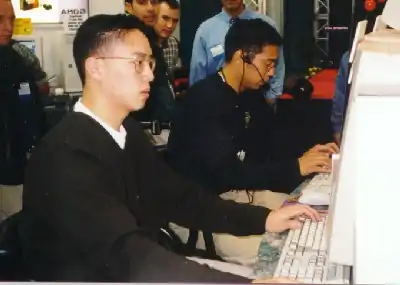 A PC Gaming scene featuring competitive esports player Thresh at Comdex 1997.
A PC Gaming scene featuring competitive esports player Thresh at Comdex 1997.
Trends
Network Gaming
The Internet was a sensation in the 1990's,[1] leading to more incorporation in games. LAN parties became common among computer gamers.[2] Many legacy dial up gaming services from the 1980's shut down in the mid 1990's and many were founded in the 1990's.[3]
- The noise of a dial up connection being made, a common way 1990's gamers got on the internet.
3D Gaming
While 3D games predate the 1990's, this decade saw a huge leap and refinement in 3D video games in terms of graphical fidelity.[4][5] More importantly, this decade also saw refinements in 3D gameplay especially in level design and control.[5][6][7] The 1990's also saw improvements to storytelling in games, allowing for richer tales and better plots.[8][9]
Popular Genres
Some terms in this section will link to Wikipedia for more information.
Platformers
Early this decade saw new and novel takes on the platformer genre, such as the fast paced Sonic the Hedgehog. Other titles evolved complexity over previous releases, such as the game Super Mario World.
3D platformers were dominated by the collectathon genre, notably by the landmark title Super Mario 64, which helped pioneer 3D control schemes. Other notable collectathons include Spyro the Dragon, Donkey Kong 64, and Banjo Kazooie.
Other notable platformers of the decade include Crash Bandicoot and Gex: Enter the Gecko.
Action-Adventure
Notable general Action-Adventure games of the decade include The Legend of Zelda: Ocarina of Time and Tomb Raider.
Survival Horror Action-Adventure games of the decade included Resident Evil, Resident Evil 2 and Silent Hill.
3D Racing games
This genre was influenced by the introductions games such as The Need for Speed (1994-1995) and the PlayStation game Gran Turismo (1997) which aimed for realistic 3D graphics and driving mechanics for a much more immersive driving experience then prior 2D racing games could provide.
Less realism focused arcade style and karting games were also released, including the original 2.5d titles F-Zero and Super Mario Kart, as well as their fully 3D followups F-Zero X and Mario Kart 64. Other notable 3D racing games not focused on realism included titles such as Wipeout, Cruis'n USA, Sega Rally Championship, and Daytona USA. Ridge Racer was an interesting example of a game that mixed very realistic graphics, with arcade style gameplay.
Shooters
A number of Shooter sub genres, especially third person shooters and fast-paced first person shooters, were pioneered in this decade with groundbreaking hit titles. Wolfenstein 3D (1992) was a landmark title in the genre, a remake of the earlier 2D video games Castle Wolfenstein and Beyond Castle Wolfenstein and one of the first popular first-person shooters ever and pioneer in 2.5D graphics, although it allowed 2D-only gameplay action, thus making it impossible to jump, go up or down stairs, or even aiming up or down. More complex shooters such as the highly controversial Doom (1993) and the tongue-in-cheek Duke Nukem 3D (1996), by Wolfenstein 3D developer id Software and the emerging 3D Realms would follow.
Other notable first person shooters would include Quake, Unreal Tournament, Tribes, MDK, Perfect Dark, and the 1997 Nintendo 64 shooter GoldenEye 007, based on the 1995 James Bond film. Later games with FPS mechanics such as Half-Life and Deus Ex would use this medium to tell detailed and immersive stories.
Point and Click Adventure
The 1990's are often seen as the critical apex of the Point and click adventure genre, where the culmination of a developers with a decade of experience during the 1980's still retained significant financial backing from publishers.
Fighting Games
Games such as Street Fighter II and Mortal Kombat would forever shape the genre with their technical and artistic decisions which skyrocketed the appeal and popularity of the genre.
Role Playing Games
Notable JRPGs (Japanese role-playing (video) games) from the decade include games III-VIII in the Final Fantasy series, Chrono Trigger, and Secret of Mana.
Notable western computer role playing games from this decade include System Shock, Fallout 1 & 2, and the first Baldur's Gate.
Other RPGs sought to subvert traditional expectations of the RPG formula, including Earthbound/Mother 2, Super Mario RPG, and Moon: Remix RPG Adventure.
FMV Games
A number of games attempted to leverage the high capacity of CD-ROM to make movies interactive using full-motion video (FMV). This was a selling point of consoles such as the original PlayStation (1994) by Sony Computer Entertainment and the failed CD-i (1990) by Philips.
Sports
At the very end of the decade, Tony Hawk's Pro Skater would spark an interest in the skating subgenre.
Strategy & Tactics
This decade saw increased interest in real time strategy games, notably with the release of Starcraft, Age of Empires, Warcraft: Orcs & Humans, and Warcraft II: Tides of Darkness.
Turn based strategy and tactics games would also see landmark titles, such as Fire Emblem: Genealogy of the Holy War, Front Mission, and Final Fantasy Tactics.
The original XCOM trilogy, including X-COM: Enemy Unknown, X-COM: Terror from the Deep, and X-COM: Apocalypse, offered a unique take on the genre with a theme of planetary defense, and offered a hybrid approach of real time strategy on a macro scale, with turn based tactics on a micro scale.
Simulation
Notable games from the decade include SimCity 2000 (Despite the name, it was released mid decade).
Timeline
1993
Tetris in Space
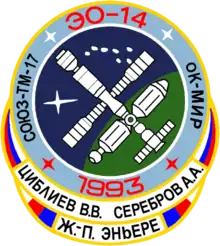
Like all cosmonauts, I love sport. My particular favorites are football and swimming. During flight, in rare minutes of leisure, I enjoyed playing Game Boy.
Cosmonaut Aleksandr Serebrov flies on the Soyuz TM-17 mission to the Russian space station Mir, bringing a MIR postmarked Game Boy and a copy of the famous Russian game Tetris to play in space during limited free time, thus becoming among the first, if not the first person, to play video games in space.[11][10]
While this may seem like a trivial fact, it represents a small though significant milestone in space exploration. Following the revolt of the crew of the space station Skylab in 1974, the welfare of spacefaring people has been of particular importance.[12] Today entertainment during extended time in space is considered an critical part of daily life.[13] This event marked a point where video games became part of that strategy.
1994
Industry Organization
In 1994 the Computer Game Developers Association is founded, later becoming the International Game Developers Association.[14]
1995
Neon Genesis Evangelion
The 1995 release of the anime Neon Genesis Evangelion would go on to influence a number of Japanese game developers.[15]
1996
Dawn of the MMORPG
The game Meridian 59 launches on PC, letting over 10,000 players play simultaneously in a 3D environment, making it among the earliest modern MMORPGs.[16] Players engage in social activities that the developers did not anticipate such as marriage and mass player killing.[17] Emergent behavior caused by the social systems massively multiplayer games would often prove an interesting field of study in the following years.
1998
.beat
Swatch .beat internet time is announced, and sees some use by players of MMORPGs for coordinating across time zones.[18][19]
Other Gaming Tech of the 1990's
The 1990's saw the first mobile phone games, as well as a number of novel small LCD games.
 A 1997 Tamagotchi, a popular virtual pet game.
A 1997 Tamagotchi, a popular virtual pet game. A 1994 Aura Interactor Force Feedback Vest.
A 1994 Aura Interactor Force Feedback Vest.
Game Gallery
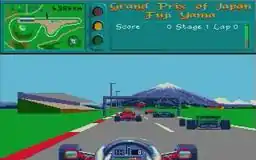 Vroom, a racing game from 1991.
Vroom, a racing game from 1991.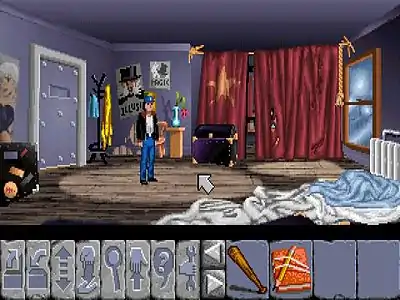 Flight of the Amazon Queen, an adventure game from 1995.
Flight of the Amazon Queen, an adventure game from 1995.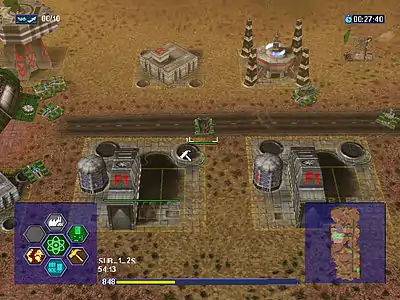 Warzone 2100, a 3D real time strategy game released in 1999.
Warzone 2100, a 3D real time strategy game released in 1999.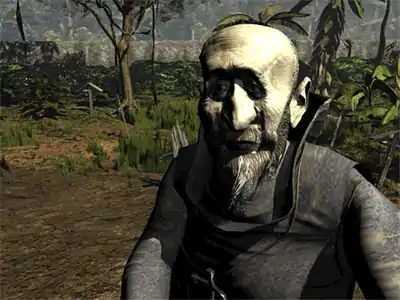 The 1999 adventure game Amerzone, showing pre-rendered 3D graphics.
The 1999 adventure game Amerzone, showing pre-rendered 3D graphics. A number of first person shooters and engines would be descended from the Quake engine, including some still in use in 2021.
A number of first person shooters and engines would be descended from the Quake engine, including some still in use in 2021.
References
- ↑ Williams, Owen (16 February 2015). "How People Described The Internet In The 1990s is Hilarious" (in en-us). https://thenextweb.com/insider/2015/02/16/ways-people-described-computers-1990s-hilarious/.
- ↑ "In-person LAN parties > Online multiplayers". 15 June 2020. https://www.imore.com/remember-multiplayer-lan-party.
- ↑ "The Game Archaeologist: Online gaming service providers of the ’80s and ’90s Massively Overpowered". https://massivelyop.com/2016/01/16/the-game-archaeologist-online-gaming-service-providers-of-the-80s-and-90s/.
- ↑ "The Magic of Early 90s 3D". 4 May 2012. https://www.gamezone.com/originals/the-magic-of-early-90s-3d/.
- 1 2 July 2010, PC Plus11. "The evolution of 3D games" (in en). https://www.techradar.com/news/gaming/the-evolution-of-3d-games-700995/2.
- ↑ Otty, Karl (28 September 2020). "In Defence of Tank Controls" (in en). https://medium.com/super-jump/in-defence-of-tank-controls-5c9d6ce2d6f5.
- ↑ "Educational Feature: A History and Analysis of Level Design in 3D Computer Games - Pt. 1" (in en). https://www.gamasutra.com/view/feature/131083/educational_feature_a_history_and_.php?page=3.
- ↑ James, Matt (29 November 2018). "The Enduring Legacy of ‘Half-Life,’ 20 Years After Its Release" (in en). https://www.theringer.com/2018/11/29/18116704/half-life-20th-anniversary-valve-fps-black-mesa-xen.
- ↑ "The 10 Best Stories In '90s Horror Video Games". 7 June 2019. https://www.thegamer.com/best-stories-in-90s-horror-video-games/.
- 1 2 Martin, Douglas (17 November 2013). "Aleksandr Serebrov, 69, Dies; Cosmonaut Who Persevered (Published 2013)". https://www.nytimes.com/2013/11/18/science/space/aleksandr-serebrov-cosmonaut-of-fettered-times-dies-at-69.html. Retrieved 21 November 2020.
- 1 2 "Auction: Nintendo Game Boy Flown In Space". https://www.retrothing.com/2011/04/auction-nintendo-game-boy-flown-in-space.html. Retrieved 21 November 2020.
- ↑ Eschner, Kat. "Mutiny in Space: Why These Skylab Astronauts Never Flew Again" (in en). Smithsonian Magazine. https://www.smithsonianmag.com/smart-news/mutiny-space-why-these-skylab-astronauts-never-flew-again-180962023/.
- ↑ Wild, Flint (8 June 2015). "Free Time in Space". https://www.nasa.gov/audience/foreducators/stem-on-station/ditl_free_time.
- ↑ "About Us – IGDA". https://igda.org/about-us/.
- ↑ "How much Neon Genesis Evangelion is in Metal Gear Solid?". https://www.youtube.com/watch?v=oOnmiG6bxYk.
- ↑ "The Game Archaeologist crosses Meridian 59: The highlights" (in en). https://www.engadget.com/2011-12-13-the-game-archaeologist-crosses-meridian-59-the-highlights.html. Retrieved 21 November 2020.
- ↑ "Finding Art in an Internet Game". https://archive.nytimes.com/www.nytimes.com/library/cyber/surf/073097mind.html. Retrieved 21 November 2020.
- ↑ ".beat: Swatch’s Insane Attempt To Reinvent Time for the Internet". https://www.themarysue.com/beat-swatch-internet-time/. Retrieved 15 November 2020.
- ↑ "PSO-World.com - Guides - .beat Time System". https://www.pso-world.com/sections.php?op=viewarticle&artid=883. Retrieved 15 November 2020.